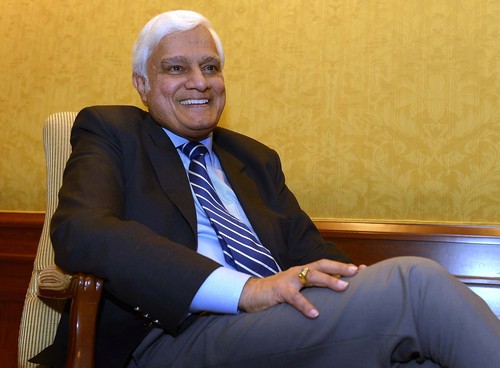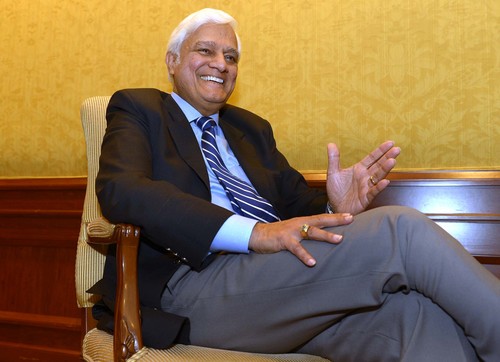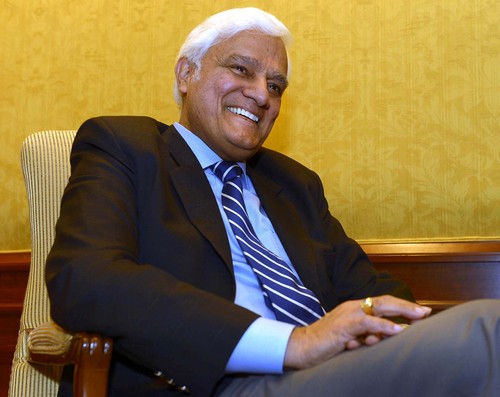This is an archived article that was published on sltrib.com in 2014, and information in the article may be outdated. It is provided only for personal research purposes and may not be reprinted.
In November 2004, Ravi Zacharias, an evangelical author and Christian apologist, became the first preacher of another faith in 105 years to speak from the pulpit of the famed Mormon Tabernacle on Salt Lake City's Temple Square.
On that historic occasion, about 5,000 evangelicals and Latter-day Saints sat side by side, listening to Zacharias expound on religious principles in the accessible style of the popular Christian writer C.S. Lewis.
The event promised to be the birth of a new era between the two groups, which had often been at odds.
"We've often seriously misrepresented the beliefs and practices of members of the LDS faith," Richard Mouw, then head of the Fuller Theological Seminary in California, said in his opening remarks. "It's a terrible thing to bear false witness. ... We've told you what you believe without first asking you."
This weekend, Zacharias is back for a bridge-building encore.
The native of India was scheduled to speak to students at LDS Church-owned Brigham Young University on Friday as well as area pastors. He also planned to meet with two Mormon apostles, according to the Rev. Gregory Johnson, leader of Standing Together, a network of Utah pastors that sponsored Zacharias' visit.
On Saturday night, LDS apostle Jeffrey R. Holland will offer an official greeting from The Church of Jesus Christ of Latter-day Saints.
The Salt Lake Tribune interviewed Zacharias on Thursday morning at Little America in Salt Lake City. Here are some of his answers:
What are the main points you will be covering in your speech at the Mormon Tabernacle?
[I will be offering] a biblical blueprint for what a nation is intended to look like and what happens when a strident, rabid secularization takes place. ... In one sense, the best way for nations to be is a secular society, but one that gives opportunity for contrary worldviews [including] religious beliefs, to be freely expressed in the marketplace. But what secularization has done in America has actually evicted any religious or transcendent worldview and has become the reigning dogma of any interaction of values and ethics. You are not allowed to invoke the basis of an absolute or ultimate purpose and meaning or destiny for life. It has become a purely pragmatically driven way of living.
To me, the most dramatic implication of the process of secularization is the loss of two definitions: sacredness of life is no longer given due credence. ... What it has done to children in our society is the devastating thing I see happening. The second consequence of secularization ... is the stifling of free expression. Relativism has become an absolute, only protecting the rabidly secular worldview. These consequence are in direct contradiction to the intent of why this nation was formed. How do we then bring about a change in society? To my way of thinking, those who claim to be followers of Jesus Christ have to set their house in order. ... I think belief will ultimately be tested — both credibility in its theory and consistency in its practice. Why we believe what we believe is going to be the crucial test for the future. Rather than come at it by saying, "I am now going to change society," we need to understand what secularized consciousness has done and what we need to do to evaluate the reasonableness and the livability of our faith.
What will be your message to Brigham Young University?
It will be in keeping with faith, family and freedom.
I am one of those foundational thinkers. It is very easy to deal with symptoms and get upset about it, but the symptoms are ultimately expressions of the roots in which this thinking is based.
When we ask about the problems of evil, the problem of pain, the question of meaning, they all begin with one assumption that we know what life is all about.
C.S. Lewis said when a ship goes onto the high seas, it has to answer three questions: How to keep from sinking? How to keep from bumping into other ships? Why is it out there in the first place?
[The first] is personal ethics; [the second] is social ethics; and [the third] is essential ethics — what is life's purpose?
I feel that every deviation in family, be it in sexuality, be it in culture, whatever, comes from our definition of what it means to be human. Unless we understand where the difference lies, we will always be attacking the symptoms, never get to the root problem.
Have your views of Mormonism changed since you came here ?
If there is anything that has changed, it is [Latter-day Saints'] willingness to enter into dialogue and conversation on these matters rather than shutting the door and remaining impervious to academic interaction. ... Obviously our beliefs are dramatically different. They know that; we know that. But I look at it this way: I am a Christian apologist. I engage Muslim audiences around the globe. I have spoken at many of their major universities. ... They invite me on the basis of my writing. They know I am a follower of Jesus Christ. They know my worldview is different, but they also know I will engage cordially and, hopefully, accurately with them. I was born and raised in India, I speak on many Hindu campuses, Buddhist campuses, stridently atheistic campuses. [Despite] my beliefs being foundationally different from the Mormon world's starting point and their emergent beliefs, I think unless you are willing to talk and dialogue honestly on this, you never get anywhere. Building a bridge doesn't mean surrendering ground.
In 2004, when Richard Mouw gave a greeting, he said evangelicals should apologize to Mormons for misrepresenting their beliefs. Do you share that view? Do you think that was an appropriate thing for him to do?
I have never talked to Richard Mouw about that. It got a lot of publicity. I am not sure the context from which he was coming. The fact is, Christians have been branded with all kinds of names also by various groups, including how the Mormons branded Christians right from the beginning. Does everybody stand up and apologize for the way people have been expressly treated? [My philosophy is:] You never judge a system by its abuse. You judge a system by what is claimed and what is believed. Mistreatment of people is there on every side. ... I am not sure Richard Mouw chose the right venue in which to say that because it stirred up more issues than answered questions. Whenever you make a statement like that, it ought to be made around a table, with discussion and interaction.
What is your hope for the relationship between Mormons and evangelicals?
As a believer in the final revelation of Jesus Christ and knowing they respect and honor who Jesus Christ is, I would hope in the dialogue we can come to biblical conclusions on who the person of Jesus Christ is. Obviously, the terrain is strewn with minefields of words, concepts and ideas that cause us to stumble. I commend [Mormons] and am grateful for the courage they have inviting someone like me. It takes a lot of trust, an incredible amount of trust, and risk taking. I am honored by that kindness.
Twitter: @religiongal —
Speech at the Tabernacle
Ravi Zacharias will speak Saturday at 6:30 p.m. in the Mormon Tabernacle in downtown Salt Lake City. His topic will be "Lessons From History: Building a Nation Under God." The event is free, but all tickets have been distributed.







